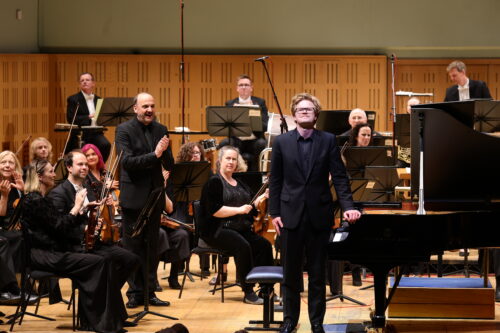 Ireland Dublin International Piano Competition 2025 – Prokofiev, Rachmaninov: Anson Ying Shun Wong (piano), Young-Ho Shin (piano), Carter Johnson (piano), National Symphony Orchestra / Jonas Alber (conductor). National Concert Hall, Dublin, 16.5.2025. (RB)
Ireland Dublin International Piano Competition 2025 – Prokofiev, Rachmaninov: Anson Ying Shun Wong (piano), Young-Ho Shin (piano), Carter Johnson (piano), National Symphony Orchestra / Jonas Alber (conductor). National Concert Hall, Dublin, 16.5.2025. (RB)

Prokofiev – Piano Concerto No.2 in G minor Op.16
Rachmaninov – Piano Concerto No.2 in C minor Op.18
Following a week of intense solo and chamber music performances, three young pianists took to the stage for the final of the 13th Dublin International Piano Competition. Two of the competitors opted to play the exceptionally demanding Prokofiev Second Piano Concerto while the third performed Rachmaninov’s ever-green Second Piano Concerto. The distinguished international jury was chaired by Irish pianist, Finghin Collins.
The first of the three competitors, Anson Ying Shun Wong, hails from Hong Kong and he has already had some success in international piano competitions. He was fully on top of the vertiginous technical demands of Prokofiev’s Second Piano Concerto. There was a good contrast between the glistening octaves of the opening theme and the dry sound he deployed for the spiky second subject. The cadenza of this concerto must be one of the most difficult things ever written for piano. Wong organised the material well and produced an impressive virtuoso display, although I would have liked a little more percussive bite. He showed impressive digital dexterity in the perpetuum mobile second movement, while in the third he made an excellent job of executing Prokofiev’s imaginative pianistic effects. Occasionally, in both the first and third movements I would have liked the voicing and shaping of the material to have been a little clearer. There was excellent coordination with the orchestra in the opening of the final movement. Wong brought energy and dynamism to the leaping first subject and lyricism to the second subject, although there was scope for this to be even more expressive. The coda was a blistering virtuoso tour de force bringing the work to a thrilling conclusion.
The second competitor, Young-Ho Shin, hails from South Korea; he was the youngest of the three competitors, aged just 17. Shin had a big sound that seemed particularly suited to Romantic repertoire, so the Rachmaninov Second Piano Concerto was a good choice. The opening chords were nicely weighted and there was a good incremental build up in dynamics before the entry of the opening theme. Shin clearly had a good rapport with the orchestra, and he vied well with them in the central section of the first movement which built up to an impressive climax. On one or two occasions, he seemed marginally ahead of his orchestral partners, but Jonas Alber did a good job in keeping soloist and orchestra together. Shin displayed some wonderful lyricism in the exquisite slow movement and the exchanges with the National Symphony Orchestra’s woodwind section had the quality of chamber music. I wondered if there was scope for Shin to use a wider palette of tone colours here and to mine the lyricism of the music even more. The finale was taken at a blistering pace: Shin’s tempo certainly matched that of Sviatoslav Richter in the latter’s famous recording of this concerto. Shin brought an enormous combustible energy and virtuoso dynamism to this movement which succeeded in bringing the house down.
The final competitor was Carter Johnson from Canada. Johnson was older than the other two competitors; he was a silver medallist at the Gina Bachauer 2024 International Piano Competition. Johnson also opted to play the Prokofiev Second Piano Competition, so it was interesting to compare his performance with that of the first competitor. Once again, Johnson was on top of the enormous technical demands, but he also brought a keen musical understanding to the piece. He performed the first movement with polish and navigated his way through the thickets of notes with enormous clarity. The cadenza at the end of the first movement was a barnstorming piece of playing. Johnson conveyed the dark sardonic sarcasm of the third movement to perfection and he clearly relished Prokofiev’s imaginative pianistic effects. The opening of the finale could have been a little more tightly coordinated but Johnson soon got into his stride with the energised first subject. He invested enormous warmth and expressive lyricism into the luminous second subject. Johnson unleashed pianistic fireworks in the final coda driving the movement to a thrilling conclusion.
All three competitors acquitted themselves well in the final and international careers beckon for all of them. I thought Johnson had a slight edge on the other two competitors as his performance was more polished and technically assured. Later in the evening Finghin Collins announced that Carter Johnson was indeed the winner of the competition with Young-Ho Shin coming second and Anson Ying Shun Wong third. I don’t always agree with the decisions arrived at in piano competitions but on this occasion, I did agree with the Jury’s decision. Carter Johnson is a worthy winner of this year’s Dublin International Piano Competition.
Robert Beattie

So proud of you Carter and your family for the loving support you have received all these years. We have known him since he was a baby and his talent at such a young age was so amazing. Watching him grow to where he is today has been such a journey. We have watched so many of his completions over the years and around the world often on a small computer with his very proud grand parents. Hope to see you at the island sometime this summer. Congratulations Dale and Patti